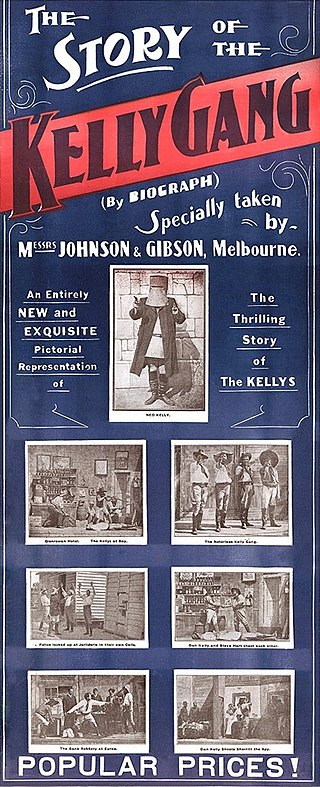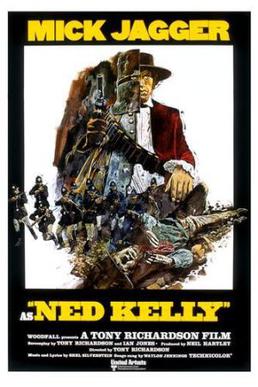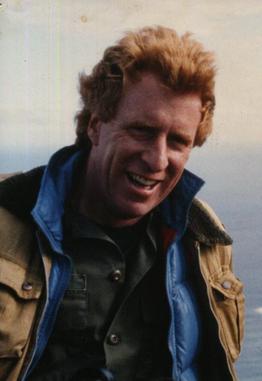Related Research Articles

The Story of the Kelly Gang is a 1906 Australian bushranger film directed by Charles Tait. It traces the exploits of the 19th-century Kelly gang of bushrangers and outlaws, led by Ned Kelly. The silent film was shot in and around Melbourne and originally ran for more than an hour with a reel length of about 1,200 metres (4,000 ft), making it the longest narrative film yet seen in the world.

Edward Kelly was an Australian bushranger, outlaw, gang leader and convicted police-murderer. One of the last bushrangers, he is known for wearing a suit of bulletproof armour during his final shootout with the police.
"Chav", also "charver", "scally" and "roadman" in parts of England, is a British term, usually used in a pejorative way. The term is used to describe an anti-social lower-class youth dressed in sportswear. The use of the word has been described as a form of "social racism". "Chavette" is a related term referring to female chavs, and the adjectives "chavvy", "chavvish", and "chavtastic" are used to describe things associated with chavs, such as fashion, slang, etc. In other countries like Ireland, "skanger" is used in a similar manner. In Ontario, the term is "hoodman", an equivalent of the term "roadman" used in England. In Newfoundland, "skeet" is used in a similar way, while in Australia, "eshay" or "adlay" is used.

Ned Kelly is a 1970 British-Australian biographical bushranger film. It was the seventh Australian feature film version of the story of 19th-century Australian bushranger Ned Kelly, and is notable for being the first Kelly film to be shot in colour.

True History of the Kelly Gang is a novel by Australian writer Peter Carey, based loosely on the history of the Kelly Gang. It was first published in Brisbane by the University of Queensland Press in 2000. It won the 2001 Booker Prize and the Commonwealth Writers Prize in the same year. Despite its title, the book is fiction and a variation on the Ned Kelly story.

The Old Melbourne Gaol is a former jail and current museum on Russell Street, in Melbourne, Victoria, Australia. It consists of a bluestone building and courtyard, and is located next to the old City Police Watch House and City Courts buildings, and opposite the Russell Street Police Headquarters. It was first constructed starting in 1839, and during its operation as a prison between 1845 and 1924, it held and executed some of Australia's most notorious criminals, including bushranger Ned Kelly and serial killer Frederick Bailey Deeming. In total, 133 people were executed by hanging. Though it was used briefly during World War II, it formally ceased operating as a prison in 1924; with parts of the jail being incorporated into the RMIT University, and the rest becoming a museum.

Trevor George Lucas was an Australian folk singer, a member of Fairport Convention and one of the founders of Fotheringay. He mainly worked as a singer-songwriter and guitarist but also produced many albums and composed for the film industry toward the end of his career. He married three times, his first wife was Cheryl, his second wife was fellow folk musician Sandy Denny (1973–1978), and his third wife was Elizabeth Hurtt (1979–1989). Lucas died on 4 February 1989 of a heart attack in his sleep, in Sydney, aged 45. According to Australian rock music historian Ian McFarlane, Lucas "was one of the most acclaimed singer-songwriters Australia ever produced and although he was held in high regard in UK folk rock circles, he remained virtually unknown in his homeland".
John or Jack Kelly may refer to:

Henry Johnson, better known by his alias Harry Power, was an Irish-born convict who became a bushranger in Australia. From 1869 to 1870, he was accompanied by a young Ned Kelly, who went on to become Australia's best known bushranger.

Peter Collinson was a British film director probably best remembered for directing The Italian Job (1969).
Alexander John Buzo was an Australian playwright and author who wrote 88 works. His literary works recorded Australian culture through wit, humour and extensive use of colloquial Australian English.

The Jerilderie Letter is a handwritten document that was dictated by Australian bushranger and outlaw Ned Kelly to fellow gang member Joe Byrne in 1879. It is named after the town of Jerilderie, New South Wales, where the Kelly gang carried out an armed robbery in February 1879, during which Kelly tried to have his document published as a pamphlet. It is one of only two original Kelly letters known to have survived.
Roy Glover is a fictional character from the British television soap opera Emmerdale, played by Nicky Evans. He made his first appearance during the episode broadcast on 4 August 1994, and departed six years later on 22 August 2000.
"Moreton Bay" is an Australian folk ballad. It tells of the hardship a convict experienced at penal settlements around Australia, in particular, the penal colony at Moreton Bay, Queensland, which was established to house convicts who had reoffended in settlements in New South Wales. The song references exceptionally brutal treatment of convicts while the colony was under the command of the infamous Patrick Logan. It also describes Logan's death at the hands of local Aborigines and the joy felt by the convicts upon hearing the news. The song may have been composed at the time of Logan's death on or soon after 18 October 1830. A version entitled "The Convict's Arrival" or "The Convict's Lament on the Death of Captain Logan" has been attributed to Francis MacNamara who was transported to Australia in 1832 and was never held at Moreton Bay. It is customarily sung to the tune of the early 19th century Irish ballad "Youghal Harbour", which was used later for the song "Boolavogue", the lyrics of which were written in 1897 for the centenary of the Irish Rebellion of 1798.

Ned Kelly was a 19th-century Australian bushranger and outlaw whose life has inspired numerous works in the arts and popular culture, especially in his home country, where he is viewed by some as a Robin Hood-like figure.

Australian Western, also known as meat pie Western or kangaroo Western, is a genre of Western-style films or TV series set in the Australian outback or "the bush". Films about bushrangers are included in this genre. Some films categorised as meat-pie or Australian Westerns also fulfil the criteria for other genres, such as drama, revisionist Western, crime or thriller. A sub-genre of the Australian Western, the Northern, has been coined by the makers of High Ground (2020), to describe a film set in the Northern Territory that accurately depicts historical events in a fictionalised form, that has aspects of a thriller.
The Last Outlaw is a 1980 Australian four-part television miniseries based on the life of Ned Kelly. It was shot from February to May 1980 and the end of its original broadcast, in October–November 1980, coincided with the centenary of Ned Kelly's death.

Ballad for One Gun is a 1963 Australian television film about Ned Kelly broadcast on ABC.
Ned Kelly is a 1942 radio play by Douglas Stewart about the outlaw Ned Kelly.

True History of the Kelly Gang is a 2019 bushranger film directed by Justin Kurzel, written by Shaun Grant, and based upon the 2000 novel of the same name by Peter Carey. A fictionalised account of the life of bushranger and outlaw Ned Kelly, the film stars George MacKay, Essie Davis, Nicholas Hoult, Charlie Hunnam and Russell Crowe.
